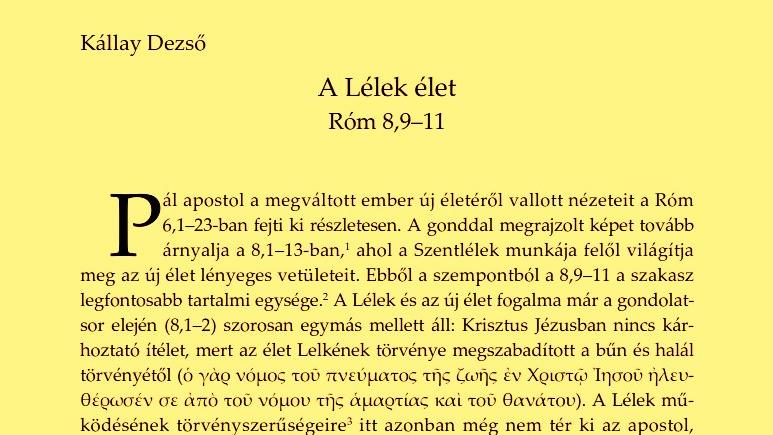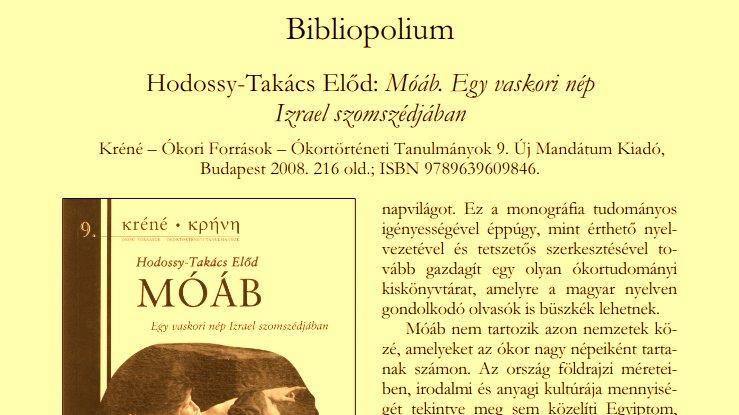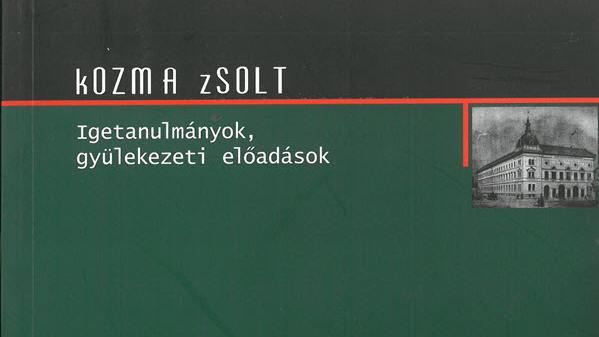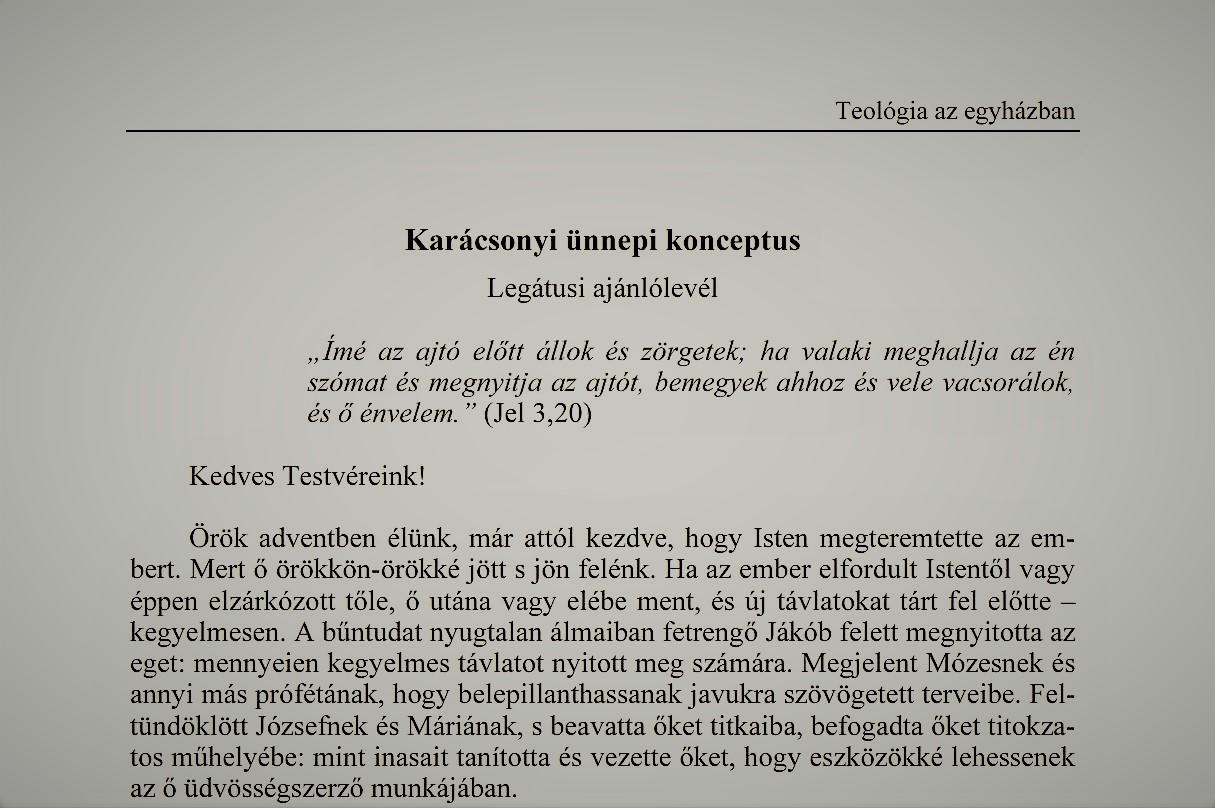Publications
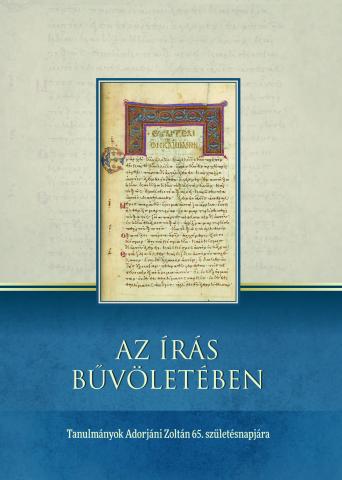
Péter Éva › 2021 › Pages: 599--610Tanulmányomban Ádám Jenő munkásságát, valamint a református gyülekezeti énekek dallamát feldolgozó egyházzenei kompozícióit mutatom be. Kodály Zoltán neve mellett az övé elhalványul, pedig a zenepedagógia területén igen jelentős értéket teremtett: a mester elveit ő ültette gyakorlatba, több évtizedes, szorgalmas munkával, nemzedékek zenei oktatását segítve. Egyházzenei művei által a gyülekezeti énekkarok repertoárja gazdagodott.
Research article › Varia, Music › zenetörténet, zenepedagógia, egyházi éneklés
Peres Imre › 2021 › Pages: 570--598Tanulmányunkban olyan halálközeli megnyilvánulásokat vizsgálunk, amelyeknél az érintett emberek aránylag pozitívan állnak hozzá a halálhoz, ami megnyilvánul pl. a sírjaikra írt szövegekben is, amelyek amolyan élet-halál mottónak, hitvallásnak vagy akár posztmortális reménységnek is tekinthetők. Mivel a korai keresztyének olyan környezetben éltek, amelyben a görög–római kultúrát, vallásokat és társadalmat szó szerint testükön/bőrükön érezték, érdekes megfigyelni, mennyire hatott rájuk ez a valós „pogány” jelenség a halál küszöbén is.
Research article › New Testament, Church history, Varia, Antiquity › halál, sírfelirat, halál utáni élet, eszkatológia
Papp György › 2021 › Pages: 557--569Ebben a tanulmányban a Zsoltárok 90,1–6 (mint a zsoltár első nagyobb egységének) masszoréta szövegét hasonlítom össze a Targumban található szöveggel, feltérképezve a fordítási különbségeket, és bemutatva az arám fordítás fontosabb jellegzetességeit. Munkamódszerem: először párhuzamos olvasásban közlöm a szakaszokra bontott zsoltár masszoretikus és targumi szövegét és fordítását, majd ezt követően kiemelem a hasonlóságokat és a fontosabb különbségeket.
Research article › Old Testament, Varia, Judaica › targum, bibliaértelmezés
Ősz Sándor Előd › 2021 › Pages: 541--556Az elmúlt években az erdélyi református és unitárius gyökerű gyűjtemények-ben vizsgáltuk tizenöt, a 16. században élő protestáns teológus, ún. „reformátor” 1601 előtt megjelent, teológiai tárgyú munkáit. A possessorbejegyzések és széljegyzetek segítségével próbáltuk megállapítani, hogy a kötetek mikor kerültek Magyarországra, illetve hungarus-tulajdonos kezébe, azután kik adták-vették, olvasták, használták őket. A mennyiségi vizsgálat segít válaszolni arra a kérdésre is, hogy mely európai teológusok hatottak a hazai reformációra, felekezetképződésre, illetve mely nyugati tudósok teológiai…
Research article › Church history › bibliaértelmezés, könyvtörténet, kommentár
Molnár János › 2021 › Pages: 526--540A Zsoltárok könyve irodalmi alkotás, amelyben az irodalom a maga módszereit, metodikáját, formáját és stiláris jellegzetességeit kínálja fel a formán és sablonon túlmutató lényeg, a hit kifejezésére és annak esztétikai megfogalmazására. Jelen tanulmány ezzel a felkínált irodalmi jellegzetességgel és sajáttal akar foglalkozni, tehát a zsoltárok irodalomtörténetével, azokkal a kérdésekkel, amelyek felvetődnek valamely irodalmi alkotás műelemzése során, de főleg a prédikációra néző exegézis keretében.
Az ilyenszerű izagógikai vizsgálat részekre bontja és érthetővé teszi a műfaji…
Research article › Old Testament › zsoltárok, irodalomtörténet
Lészai Lehel › 2021 › Pages: 510--517The “Why?” question emerges inevitably whenever a tragedy or trauma happens in our human lives. The case was hardly different in prehistoric times, in the Old Testament, or in Jesus’s era. It is an intriguing question therefore what Jesus’ attitude and approach would have been to such unexpected disasters.
Research article › New Testament › sorstragédia, exegézis (szövegértelmezés), újszövetségi exegézis
Ledán M. István › 2021 › Pages: 494--509A lélek zavarba ejtő korporalitásával nem csupán az Újszövetségben, hanem a görög filozófiában, a görög irodalomban, és az ógörög sírfeliratokon is találkozhatunk. Tanulmányunkban feltérképezzük a különféle antik filozófiai iskoláknak, a görög irodalomnak, valamint az ógörög sírszövegeknek a „lélek materialitásával” kapcsolatos meglátásait és elképzeléseit, ezeket összevetjük az újszövetségi elképzelésekkel, majd levonjuk a szükséges következtetéseket.
Research article › New Testament, Varia, Antiquity › lélek, eszkatológia, feltámadás, halál utáni élet, sírfelirat
Kustár Zoltán › 2021 › Pages: 472--493Isten igazságosságának a kérdése mindig is foglalkoztatta Izrael bölcseit, de igazán élessé a kérdést a hellenizmus kihívása tette. Valóban van értelme a hitnek? Van haszna az istenfélelemnek, és valóban aszerint alakul kinek-kinek a földi élete, ahogyan Izrael Istenének akaratához viszonyul? A hellenizmus filozófiai irányzatai e kérdésekre nemmel feleltek. Ebben a tanulmányban a Prédikátor könyve sokat emlegetett „szkepszisét” és életigenlését kívánom a theodicea szemszögéből vizsgálódás alá venni. Meg-győződésem, hogy a könyv többlépcsős irodalmi folyamat eredményeként állt elő, s így a…
Research article › Old Testament › teodicea, hellenizmus, istentisztelet
Kozma Zsolt › 2021 › Pages: 458--471A napjainkban történő népvándorlásra lehet-e bibliai analógiát találni? Mostanában többször mondtam, hogy kényszeralkalmazások fogságában vagyunk, s ez elsősorban nemcsak a most felvetett kérdésre vonatozik, hanem homiletikai ficamként a teológiai minden tudományágát kísérti. Tudom, hogy ezek az alkalmazások, az időszerűsítés nyomása alatt jóhiszeműek, de megtörténhet, hogy tudománytalanok, s ezzel megerőszakolják a Szentírást. Nézzük meg a szóba jöhető történeteket.
Research article › Old Testament, New Testament › népvándorlás, migráció
Kovács Sándor › 2021 › Pages: 443--457A lelkészi szolgálatot vállalók életének kiemelkedő eseménye a lelkésszé avatás vagy népegyházi kifejezéssel élve, a papszentelés. A protestáns egyházak szóhasználatában megmaradt ugyan a lelkész- vagy papszentelés kifejezés, de a római katolikus egyház gyakorlatával ellentétben ez nem szentség, hanem az egyház által gyakorolt szertartás, ritus ecclesiasticus. Ebben a tanulmányomban az unitárius paprendelés (ordináció) gyakorlatáról, illetve a lelkészi oklevél és eskü szövegének változásairól értekezem röviden.
Research article › Church history › unitárius egyháztörténet, lelkészképzés, unitárius lelkészképzés, lelkészi oklevél
Kovács László Attila › 2021 › Pages: 436--442Új teológiai fogalmak megjelenésének vagyunk a tanúi – nemcsak tanúi, de asszisztálunk megjelenésüknél. Az online istentisztelet fogalma tulajdonképpen már évek óta a levegőben lebeg, de nem úgy gondoltuk ezt az új lehetőséget, ahogy a mögöttünk álló hónapokban éltük át. Hogy jó volna élőben közvetíteni istentiszteleti alkalmainkat a rendelkezésünkre álló hálózaton – ez az igény már többéves múltra tekint vissza. Szabad-e a valóságos istentiszteleti közösséget aláásni azzal, hogy virtuális pótlékot kínálunk helyette? Ezt a dilemmát sokan megfogalmazták, ezért óvatosságra hajlottunk minden…
Research article › Systematic theology, Practical theology › liturgia, úrvacsora, on-line istentisztelet
Koppándi Botond Péter › 2021 › Pages: 415--435Ez a tanulmány az első és a második világégés közötti korszak homiletikai kiadványaiból válogat, bemutatva néhány, az elméleti és a gyakorlati homiletika tárgyköréből származó alkotást. Ezek között van a lelkipásztorok számára készült szakkönyv, illetve a lelkészek által írt prédikációkat tartalmazó kiadvány is. Inkább deskriptív, leíró jelleggel tárgyaljuk az ebben a korszakban megjelenő műveket, keresve bennük a korra leginkább jellemző sajátosságokat, rámutatva arra, hogy a tárgyalt korszak alkotásaiban mi lehetett inspiráló az akkori hallgató, olvasó számára, illetve hogy mi lehet…
Research article › Practical theology, Church history › homiletika, homiletika-történet, unitárius homiletika
Kolumbán Vilmos József › 2021 › Pages: 396--414A Református Főkonzisztórium kérésére a kézdi egyházmegye is összeállította az 1780 és 17847 közötti időszak mesteri jövedelmeit. A konskripciót az előre megadott minta alapján latinul állították össze. Az iskolai felmérésekben első helyen az iskolába járó fiúk és lányok számát közlik, külön megjegyezve azt, ha volt a településen olyan gyermek, akit a tanító ingyen tanított.
Research article › Church history › erdélyi református egyháztörténet, oktatástörténet, egyházi iskolák, Kézdi-Orbai Egyházmegye, egyházi szolgák, egyházi szolgák javadalmazása
Kókai-Nagy Viktor › 2021 › Pages: 379--395Philónnál a próféták, prófécia szavak jelentéstartalmát nem választhatjuk el az inspiráltság kérdésétől. Művei alapján egyértelmű ugyanis, hogy gondolkodásában ez ugyanazt az Isten kijelentését közvetítő állapotot jelöli. Az inspiráltság, eksztázis legmagasabb formája a prófétálás, amikor az ember többé nem ura saját értelmének, hanem Isten kisajátítja magának az embert és a Lélek használja hangképző szerveit. Ebből adódóan Philón szóválasztása a prófétálás jelenségére vonatkozóan alapvetően a nem bibliai görög nyelvből származik.
Research article › New Testament, Varia, Judaica › prófétálás, prófétaság, ihletettség (inspiráció)
Kató Szabolcs Ferencz › 2021 › Pages: 364--378Pál apostol az 1Kor 15,20-ban azt írja Jézusról, hogy feltámadása által az „el-aludtak első zsengéje lett”, azaz az örök életre való feltámadás első példája. Az itt megjelenő ἀπαρχή kifejezés az aratás első termését jelöli, a leghamarabb beérő kalászokat. A 15. fejezetben az apostol a feltámadás folyamatát a vetés és az új növény növekedésének képével érzékelteti (36–37. versek). Ehhez a képhez zökkenőmentesen simul az első kalász, az újzsenge képe, amely mintegy a végeredmény felől utal a későbbi metafora értelmére. Feltűnő azonban, hogy az újzsenge bemutatása különleges szereppel bír az…
Research article › Old Testament, New Testament › feltámadás, test feltámadása, újzsenge
Karasszon István › 2021 › Pages: 353--363Az alábbi sorok azt kísérlik meg, hogy formai és műfaji szempontból vegyék újra górcső alá a 116. zsoltárt, s a két módszer konkurenciájában próbáljanak döntésre jutni – persze nem egyik vagy másik módszer, hanem inkább a jobb értelmezés érdekében.
Research article › Old Testament › exegézis (szövegértelmezés), zsoltárok, ószövetségi exegézis, formakritika
Kállay Dezső › 2021 › Pages: 330--352A könyörülő Úrról festett portré meghatározó vonása Máté Jézusról szóló beszámolójának. A Mt 8,1–15 éppen ezt az alapgondolatot villantja fel elsőként az evangéliumi elbeszélések sorában, hogy egyértelművé tegye: aki hatalommal tanít Isten akaratára, és aki ezt a hatalmat kézzelfoghatóvá is teszi gyógyító tettei-ben, nos ez a Jézus, a könyörülő Úr, Isten mennyei uralmának letéteményese az emberek között. Mindezt Máté úgy juttatja kifejezésre, hogy gondosan elkerüli, hogy a Jézus könyörülő jóindulatára konkrét fogalommal utaljon. Még ott sem él a kínálkozó lehetőséggel, ahol természetes…
Research article › New Testament › gyógyítás, csodaelbeszélés, Jézus csodái, exegézis (szövegértelmezés), újszövetségi exegézis
Juhász Tamás › 2021 › Pages: 319--329A jelen írás a megszentelés bibliai, hitvallási és dogmatikai értelmezése körüli félreértéseket és az ezek nyomán kialakult téves egyházi gyakorlatot kívánja szemügyre venni. A kérdésről szóló bibliai és egyházi tanítást csak annyiban vázolja, amennyiben a benne rejlő igenből a nemek is érthetőbbé válhatnak.
Research article › Systematic theology, Practical theology, Varia, General theology › megszentelés, lelkészszentelés, szent és profán, megszentelődés
Hodossy-Takács Előd › 2021 › Pages: 299--318Jelen írásunk a próféta életrajzának egy különleges szeletével foglalkozik. Ez a tanulmány a próféta és szülőhelye kapcsolatáról szól. A könyv nyitánya szerint Jeremiás az „Anátótban lakó papok közül való volt” (1,1). A 32. fejezet tudósítása szerint egy rokona földet kínált neki eladásra, igaz, meglehetősen ellentmondásos kontextusban: a próféta ekkor már raboskodott, a hódító babiloni sereg pedig már szó szerint a kertek alatt járt. Írásunk erre az elbeszélői elemre, a földszerzés motívumára fókuszál.
Research article › Old Testament › Jeremiás könyve, ingatlan, szimbolikus cselekedet
Graaf, G. Henk van de › 2021 › Pages: 275--298Amikor 1968-ban a feleségemmel Romániába mentünk, az első másfél évben szinte egyetlen honfitársunkkal sem találkoztunk. Csak a hetvenes évek közepén vált szokássá, hogy ha az úton németalföldi jelzésű autó jött szembe, a fényszórónkat rávillantottuk vagy kézfelemeléssel köszöntünk egymásnak. De ha ugyanezt a kilencvenes években is így csináljuk, közveszélyt jelentettünk volna az utakon. Hiszen akkor folyamatosan csak köszöngethettünk volna egymásnak. Az akkor látott sok németalföldi között lehet, hogy volt néhány turista is, de túlnyomó többségük egyházi ember volt, aki partnergyülekezete…
Research article › Church history › holland-magyar kapcsolatok, hollandiai református egyházak, hollandiai vendéghallgatók, Németalföldi Románia-Tanács Alapítvány
